


 |
 |
 |
| HomeAbout Billiards DigestContact UsArchiveAll About PoolEquipmentOur AdvertisersLinks |
|
Browse Features
Tips & InstructionAsk Jeanette Lee Blogs/Columns Stroke of Genius 30 Over 30 Untold Stories Pool on TV Event Calendar Power Index |
Current Issue
Mecca Money and mayhem on the other side of the tracks. By Peter Warren Photos by Emily Kask 5:50 p.m. — To find the best action in New Orleans, and maybe even the country, you have to cross the train tracks. I didn't know that when I first pulled up to the world-famous Buffalos Billiards on the Tuesday before Memorial Day. Here's what I did know. Buffalos is renowned for one-pocket and even more renowned for its gambling. The tournament I was attending, the Ninth Annual Buffalos Pro Classic, is considered one of the best events on the calendar. It brings out the best players, the best competition and, arguably most importantly, the best payouts. “This is like the Masters,” tournament director Jason Hill would later tell the crowd after Wednesday night's Calcutta. “This is where the best of the best get together and test their skills. There are no time limits. It is the purest form of one-pocket for the most amount of money that you can get.” But the tournament is only part of what is going on inside the retro poolroom. For some people attending, what everyone simply calls “the action” is the biggest draw. There are racks for thousands of dollars, and plenty more in side bets. There are people with stacks of bills looking to double their money. There are Calcuttas that make other tournaments look like child's play. If you like money, this is the place you want to be at all hours of the day. I wanted to experience it for myself. 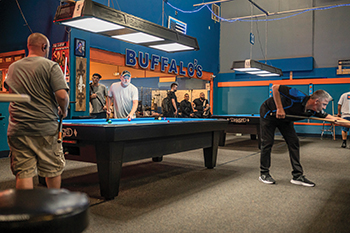
Walking into Buffalos that evening, I knew I was going to spend the next nearly day-and-a-half immersed in the gambler's paradise. I'd go back to my hotel room a stone's throw away to sleep and maybe grab a bite at a fast-food joint on the parkway. Otherwise, I'd be at the legendary pool hall witnessing wins that could pay a person's salary for months or more. “I've had $50,000 wins. I've had $100,000 wins. You're not gonna win that nowhere else,” says Tony Chohan, the one-pocket legend and a house pro at Buffalos. “You can't go nowhere else in America and really win that. You might be able to do it in Vegas sometimes but that's not even that often. “This is really the Mecca of Pool.” Between the building and its full parking lot is one set of train tracks on the ground and another set elevated high in the air. Trains will pass by on the tracks in the sky but none on the ground while I'm at Buffalos. But there's still a railroad crossing and a yield sign. Sure, it's warning you about potential trains. I'd argue it's better served as a welcoming to Buffalos, that you're entering something almost sacred. That you're entering Mecca. 6:58 p.m. — Here are two things to know about Buffalos before we fully jump into the story: the poolroom is open 24-7 and people can find a game at almost any time. House tables are open to play on at all times, and the tournament tables are available to anyone when official games are wrapped up for the day. But one of the first people I interact with isn't here to win some money playing hours and hours of pool. It's a 66-and-a-half-year-old man wearing a New Orleans Saints hat and jersey who in addition to loving pool also enjoys Louisiana bow fishing. Mike Rotolo grew up around pool tables. His grandfather owned a bar and Rotolo would shuffleboard balls around as a little tyke. He started really learning the game when he visited his father working for Shell at the mouth of the Mississippi River. “This was the first facility that Shell Oil built for sleeping out there,” he says. The place had a pool table. The rest is history. Things changed a few years ago when Rotolo's wife Joan retired from her job working for the state. Three months later, she died of pancreatic cancer. “It took a year for me to learn how to be me again,” Rotolo says. Playing pool at Buffalos helped with that. Now retired, Rotolo had the time to start playing with more regularity like he did back in the day. “It is a way of soothing the soul,” he says. 11:23 p.m. — New Orleans is a gambling town — always has been too. A 1970s government report on the history of American gambling highlights New Orleans multiple times as the place where gambling took off in the early United States. Most American-invented gambling games were born in the South in the 1800s with New Orleans leading the way. Among the games credited by the report as being invented in New Orleans is American poker. “The first gambling houses were built in New Orleans by John Davis, a man of society and culture who also brought the opera to that city,” the report reads. “Davis called the gambling houses palaces of fortune, and they were appropriately decorated with ornate imported furnishings and handsome paintings. Gamblers from all over the country were attracted to New Orleans to play for high stakes and, often, heavy losses.” The report later tells of an unlucky Greek merchant's trip in the 19th century to New Orleans when he left the city down a half-million from gambling. Buffalos might not bring opera to Louisiana, or be furnished with expensive paintings and luxurious furniture, but it does continue that gambling atmosphere like no other. Most of the people inside the blue-painted space have cash and don't want them to burn holes in their pants pockets. As multiple people tell me throughout my time, if you want a bet — of any kind — you can find it here. So, while Chohan is on his way to winning the one-day one-pocket tournament, I find people looking to make some quick cash. It's a group of guys surrounding one of the pool tables with a larger group surrounding them flipping quarters. The call is simple: heads or tails. The payouts are in the four figures. “You ever seen anything like that?” Dominick Dunn, an action-crazed Floridian and one of the quarter flippers at Buffalos, asks me later. “Flipping quarters for $7,000.” 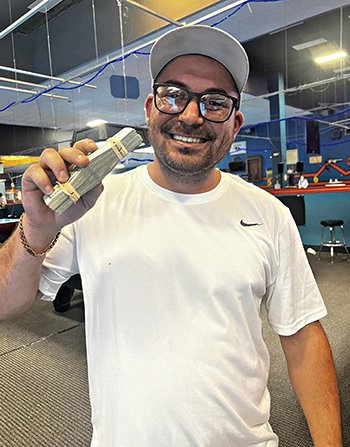 Floridian Dunn flipped out on all the action. I haven't. The pace of the action varies between quick flips and exchanges of money and trash talking across the table. Consiglieres drop in to consult with their friends about the situations at hand. “I gotta be the worst caller this side of the Mississippi,” says one guy in a red shirt, who always stares down his opponent as he flips the quarter up in the air. Guys call out others around the table. They slide bills across when they lose and see them slide back when they win, see-sawing back-and-forth like two kindergarteners at the playground. All the while “you're just praying that you got the right call,” Dunn says. Amid all the coin flipping, one man is trying to get a card game going. He's asking and asking but no one is hitting. But then suddenly the vibe switches. One guy takes out $5,000 in twenties from a black leather case. The coins go away and the cards come out. Four players surround the table to play Four Card Pot Limit Omaha. It's all happening quite fast at this point. On the second hand, someone goes all in and puts $4,200 in a pot that already had more than a grand inside. A fellow player matches him and puts more cash on the table. It would make almost anyone's eyes pop, and even at Buffalos it seems to draw people's attention. The guy who matches wins the hand and grabs the nearly $10,000 to make himself a nice early win. But the loser doesn't leave the table. He just buys back in for $5,000. 1:13 a.m. — Buffalos layout is expansive but presents itself like a museum exhibit. You move through it once and you understand why everything is where it is. The main room is rectangular with the bar, kitchen and seating area to your right. Deep in the left corner is the workspace of Buffalos cue doctor with two lines of house tables working their way up the room. Past the kitchen on the right are where the tournament tables are located. A walkway cuts through the two sides like the Mississippi River. In the back left is the main table with tables U-shaped around it for prime viewing and high bar tables surrounding that. Beyond the main playing area was a side spot on the right past the last tables for vendors and past that were the bathrooms. A whole new room also opened ahead of the tournament after Buffalos bought the property next door. There are certain things you're destined to see when you meander through Buffalos, through the local games, the tournament games and the big money spectacles scattered throughout like an impressionist painting. The poolroom's namesake is not one of them. James “Buffalo” Leone operated mostly in the shadows during my time at the tournament. (In fact, he generally doesn't allow photos to be taken of him.) That's how he and his general manager “Bullseye” like it, although Bullseye is more front facing as he helps with the Calcutta and with other operations. It's a different dynamic from Buffalos social media presence, where he plays the role of promoter and storyteller quite well. Buffalo was likely to be found, while I was there, in an office in the back of the hall, past the main table and through a little corridor with boxes and boxes of alcohol to sell. That's where he was when I met him early in the hours past midnight of my first night. We sat down in two comfy recliners that faced three flat screen televisions above a bunch of wires. Many posters lined the walls of the cluttered office. “I've never been interviewed before,” he says as we start talking about life as a poolroom owner. Leone's nickname, which since everyone — long-time friends, top players, pool hall staff — calls him that we will too, comes from his Western New York roots. He came to New Orleans in the early 1980s from outside Buffalo. He started working at the old Sport Palace poolroom and later became a partner. Buffalo got a place of his own in the early '90s, hopping around a few different sites before landing at its current location. The tournament itself started nine years ago at the previous Buffalos location on Airline Drive. “I just think that it snowballed,” he says. “You got four or five guys that gamble high. They have money. They like pool. Then a couple more come in on it and then all of a sudden…a lot of Detroit and Atlanta people were coming. It just kind of went from there.” Buffalo talks like a car cruising on a warm summer's eve and our conversation is full of pregnant pauses. It's late at night, the chairs are comfy, and I imagine Buffalo, like me, is getting a little too relaxed sitting in the recliners. But Buffalo has lived in a coffee table book full of stories over the years. Stories about slot machines and big-money matches and plenty more. 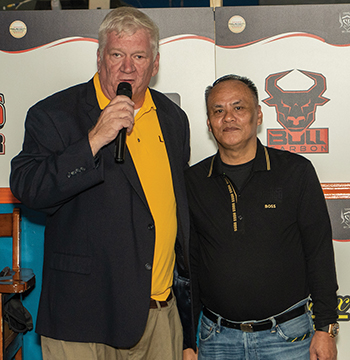 Attorney and event backer Joe Long (left, with Francisco Bustamante), invested in the Calcutta. The stories he tells that seem to most reveal his character, however, are the stories about his employees. It's not easy to run a poolroom. There's a certain toughness you need to have. Yet Buffalo says he never really fires anyone, and when he does, they tend to end up coming back. Those stories go hand in hand in what the players and spectators all say about Buffalo. That he's a player's owner and he caters to what they want. That he goes above and beyond to make the poolroom great. This year, he even paid Filipino legend Efren Reyes' hotel room and gave him expense money to secure his appearance at the tournament. “The guy's a saint,” Chohan said. “He's got a heart of gold. If there's a guy ever going to heaven, it's got to be him. If he don't go to heaven, none of us will.” 4:01 a.m. — Background music plays on Buffalos speakers but the real symphony is the clinks and clanks and taps and tinks of the pool balls on the bevy of tables throughout the venue. “It's humbling just how many great players come down and how much action there is from the whole week, even after,” says Randy Whelan, a local who has been part of the Buffalos fabric for years. “They'll stay three or four days after. From just average players to the best players, just every table, all day, all night, all morning long.” This night, Whelan is up an elevated surface watching a concerto in the form of a two-on-two matchup on the main table. The two sides had started playing the night before continuing again mere minutes after Chohan defeated Josh Roberts in the one-pocket mini tournament around 2:30 a.m. There wasn't much talking during the game as the melody of pocketed strikes and misfired shots was more than enough for the small crowd of observers waiting for daybreak. Everyone was focused on the action at hand. That continued each time I walked by the table over the next 14 hours or so. That's because they were still playing. I circled back around 8:00 a.m. to see Chick-fil-A wrappers from a breakfast order of a dozen biscuit sandwiches scattered on a table. Hours later lunch arrived in the form of a Raisin' Canes bag and numerous chicken fingers. As I walked through Buffalos at all hours of the day, came back and returned from naps a couple of times, the group, which included Nizar “Tiger” Faraj, was still playing. Their focus never seemed to waver, and the crowd obliged by keeping the volume down. “I was really tired, to be honest,” Tiger tells me later after wrapping up the day, going home to sleep and then coming back in the middle of the night. “I'm not used to playing for a long time. We could have won a lot. We still ended up winning.” They were playing for $8,000 a game, and Tiger's duo ended the day up $32,000 when they departed from the table after 6 p.m. to let the Calcutta begin. “There's always action here,” Tiger says, maybe the biggest understatement of all time. 7:30 a.m. — I returned to Buffalos after a short nap early in the morning. It's emptier than it was at night but there's still games being played, people mulling about. One thing that is absent, notably for some, is cigarette smoke. That's because smoking is no longer allowed during Buffalos Pro Classic. You can either thank, or curse, Carl Bolm for that. As with everything I come to find out about Bolm, the story changes ever so slightly depending on who's telling it. Long story short, Bolm offered Buffalo $10,000 to make the tournament nonsmoking. Buffalo told me that after seeing a positive response on Facebook to making it nonsmoking, he accepted the cash. “Sure enough, Carl came in last year Tuesday and paid,” Hill told me the previous night. “Paid him the $10,000, and then he proceeded to win about $180,000 gambling.” Other than the owner himself, there's no one talked about during my trip to Buffalos more than Carl Bolm. He's not a local nor an established figure with decades in the world of pool. But he's become intertwined with Buffalos just like Chohan and other pro stars. Bolm hasn't arrived by Wednesday morning but I've already learned a lot about him, or more accurately, I've heard a lot about him. He's either a millionaire or a billionaire, depending on who you talk with. He's coming maybe today or tomorrow, or he might not be coming at all this year — and when he does arrive, he may do so on a private jet. And when he finally arrives, well that is when the stuff of legend happens. “Carl, two years ago, came in here and lost $405,000 in three days,” Hill recalls. “Lost 200,000, lost 93,000 the next night and then lost 115 the next night, drinking wine and smoking cigars the whole time. I guess if you have a billion dollars, losing 400 is like whatever. But it's still an insane amount of money to me — to anybody.” But even that story pales in comparison to a favorite tale of many in Buffalos: his big match versus Dunn last year. “If he likes the game, he covers all the bets,” Hill says. “If you want to bet, you bet with him. But his rule is you have to bet $5,000 increments. He's like, ‘I'll cover all the bets, but I'm not going to cover 500 here. 300 here. If you want to bet, we'll do at least 5,000.'” The game, as Hill remembers, was a race to 11, 9-ball on a bar table for $120,000. “There was like 200-and-something thousand in the middle,” recalls now 19-year-old Brent Worth from Hampton, Va., who watched the match during his first trip to Buffalos. “That was crazy.” The exact money of that game always seems to change depending on who is telling the story. But the money, crazy as it sounds, seems to be less important than the theatrics of it all. “I see a guy betting $100,000,” Hill says. “I'm gonna watch.” 2:12 p.m. — Here's two things you don't have to do when you're at Buffalos: play billiards or sleep. I saw plenty of people who weren't doing the former and just a few who weren't doing the later. 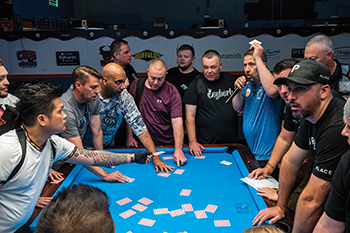 Post-calcutta mayhem continues when the top players gather to pull cards to determine their positions on the flow chart. I had met Matt Fauver, a Nebraskan who lives between Omaha and Lincoln, about 11 hours earlier. He follows Buffalo on Facebook, and posts of the action entranced him to come. This year, he arrived before the tournament to watch the Chohan v. Billy Thorpe contest the previous week and is staying through Memorial Day. “Nebraska doesn't have much gambling,” Fauver says as he explains what his friend's think when he tells stories of his visits to New Orleans. “It's hard to conceptualize how much gambling it is, and then I was talking about how tough this table is to play on because most people aren't playing on equipment like that. I've seen great players struggle on this table.” Raymond Barrios' friends from Dallas can't believe it either. “They don't understand it,” Barrios said. “They believe it, but they can't fathom 300-something-thousand dollars.” But he doesn't need them to understand. The thrill is being in the building and watching. That thrill is what keeps Boogie Long coming back for the past two decades. “Everybody's willing to bet something,” the soon-to-be-36-year-old Louisiana native says. “Everybody waits all year and saves up.” Long gets in on the action by playing but said he makes more money side betting. “I'm a small-time fish,” Long said. “They got way bigger fish than me.” At this point on Wednesday, he tells me he's been up for the past 30 hours, including the last 22 hours in the poolroom. He claims he's stayed up for over four straight days at Buffalos. It was 2019. He walked in at 7 p.m. on Tuesday and finally went to a hotel room at 10 p.m. Friday. All he needed was a 10-to-12-hour sleep. Then he trekked his way back to Buffalos. 5:54 p.m. — The One-Pocket Calcutta at Buffalos is not for the faint of heart — or, more accurately, the faint of wallet. That's what I am learning as I talk with John Mars with only minutes remaining before the auction begins. Mars and his father, who is sitting next to him at one of the corners of the U-shaped ring, aren't here to mess around. This is only their second time attending Buffalos. They came down in 2023 because the tournament moved to non-smoking following Bolm's offer. “I wasn't sure I was gonna take the $10,000 until I mentioned it on Facebook and then everybody that thought we were gonna take it and go nonsmoking said, ‘Well, if you go nonsmoking, I'm coming,'” Buffalo told me. “Then I seen John Mars said he was coming and I'm going, ‘Jeez, maybe I oughta.' That's why I did. It made the Calcutta blow up.” Mars set the tone of the 2023 Calcutta by winning the first blind bid he recalled at $37,100 and snagging Alex Pagulayan. He said he then started the bidding on the next blind bid at $37,000. “You have to make sure that the other players don't go too cheap if you're paying up that much for the blind bids,” he says. The result was the largest Calcutta ever at the event. Discussion of this year's Calcutta over the previous 24 hours had been centered on what most everyone expected to be the largest total ever. Although Pagulayan was missing the event, some hedged their predictions about how high the total might go. And by hedging, I mean betting on the over-under for the overall Calcutta. “That's what everybody is betting on,” Dunn says. “They're betting 1,000 or 2,000 on whether it gets over or under.” Some were even betting on the over-under of the individual competitors. 6:41 p.m. — “We got an opening bid?” PoolActionTV's Ray Hansen asks the crowd as the Calcutta officially begins with the first blind. “20!” someone yells out. But that prayer is ignored because someone else has already bid $30,000. A few seconds later, someone else bids $35,000. Then Joseph Long, with one seat between him and Mars, calmly calls out “36.” A lawyer and one of the main backers of the tournament, Long is not afraid to go after someone he thinks has a shot at winning. Hansen continues his auctioneering monologue and after about 10 seconds of waiting, Mars puts his right hand in the air and flicks his index finger. No words need to be said, no big deal made of it all. He bids $38,000 but Hansen says that had just gotten a bid of that amount, so Mars bumps it to $40,000. Nobody wants their poker face to crack and let an eagerness about the bidding come through. Long coolly bumps it up to $41,000. A few seconds later, Mars flashes a peace sign, and the bidding rises to $42,000. Then a new player enters the mix. Tony “Grish” Grisham, with Chohan sitting right next to him, calls out “43.” Mars looks over to his right at his father and smiles. His father turns to meet his reaction and nods. The next thing you know, Mars meets Hansen's eyeline and puts his hand in the air for $44,000. But then comes the biggest chess move of the first round of the auction. Grisham immediately responds to Mars' bid by upping him to $45,000 before anyone in the building had time to blink. Grisham is farther down the left side of the table from Long and Mars with his arms crossed. Everyone waits to see if there will be a response to his attack. Long has a pen in his right hand, seemingly ready to write down the final bid on his paper. Mars looks over at his father again and the two briefly discuss the situation. But he keeps his hands down. The first blind bid goes for $45,000. Grisham nabs the star next to him. “Tony was who I was coming here to buy,” Grisham tells me later. The two had an agreement coming into the tournament that Grisham would pay Chohan's auction fees. “I knew it was gonna be expensive, but I was I prepared to bid a certain amount,” Grisham explains. The whole exercise took just over three minutes but the gripping nature of it all made it feel much longer. “I didn't know the guy that was bidding so I thought he might take Fedor (Gorst),” Mars says. “I didn't really want to keep bidding it up too much higher than that. I was hoping that he would take Fedor and then I could get the second blind bid. But he ended up taking Tony.” 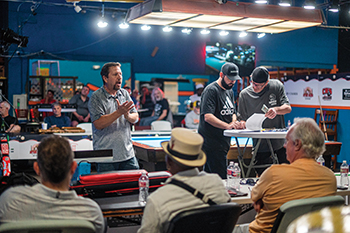 The main event at Buffalos is actually the Calcutta, overseen by Hansen, which added a princely $314,800 to the event's kitty. The second blind bid adds more drama to the proceedings as well. Long leads the way with the $41,000 set to be a high bid. Hansen had already hit the audience with a “Going once” proclamation, and delivered a “Going twice,” when Mars jumped in and threw up two fingers once again. Long nodded his head at the move but wasted no time dillydallying. He pointed his finger, and the high bid was his again. Hansen soon calls out, “Sold!” and Long casually says, “Fedor Gorst.” Long had projected Gorst going first, and later said he thought $43,000 was a fair price. “You want to get at least one player in the top three,” Long says. “Because with the format the way it is, you'll make a little money even if you come in third place.” Long would end up getting the third blind bid at nearly half the price of Chohan, grabbing Roberto Gomez at $26,000. Evan Lunda went fourth in the blind bidding at $24,000. Mars would finish the Calcutta with just one player, Thorpe, grabbing him for $15,000. The Calcutta rolls along for over two hours as the bidding ebbs and flows like the tides. Most of the remaining players go for numbers in the four-digit range, but not everyone. A few more players are bought for between $10,000 and $15,000. At the end of the auction, Hansen announces to the crowd still gathered maybe the most unsurprising news of the week. “I'd like to announce a new record here,” Hansen says. “This might even be a record for the one-pocket tournaments in the world: $314,800.” But even with hundreds of thousands of dollars being handed out in prize money between the Calcutta and the general payouts, the discussion about the money continues. “If we could get like three or four or five other good players like Dennis (Orcollo), Shane (Van Boening), (Josh) Filler, Alex (all missing from the field), I mean, we could very easily break 500,000,” Chohan says. 11:10 p.m. — It was nearing midnight, and I was once again in the back office of Buffalos, melting into one of the comfortable recliners. Next to me this time was Long, who has been at the Pro Classic since the beginning. “We were able to create something really special in Louisiana so that we don't have to go around the country to watch the pros play,” Long said. “They all come to our state.” Louisiana wasn't always his state. He grew up a Navy brat, and his father's final assignment was in New Orleans. It's where he graduated high school. When Long himself later left the Army, he decided to come back to Louisiana. He was tired of traveling and wanted to form roots. Now he's been in the state all but one year since 1990. I ask him about his strategy during the Calcutta, where he not only got big names at the top of the board but also snagged players throughout the board like a Wall Street stockbroker building out a diverse portfolio. “I had done a forecast,” he explains. “I didn't realize they were going to hold it to 32 when I did my forecast. I had it based on 37 or 38 players, and I thought there would be about $360,000 in the Calcutta. Based on that, I figured out what a fair price would be for each player and then their odds of winning the tournament.” He estimated the first player off the board to be between $42,000 and $46,000, which was correct. But he thought it would be Gorst. Chohan going first changed things. “That allowed me to get Fedor at 43,000 which I thought was a fair price, especially with Tony going at 45.” 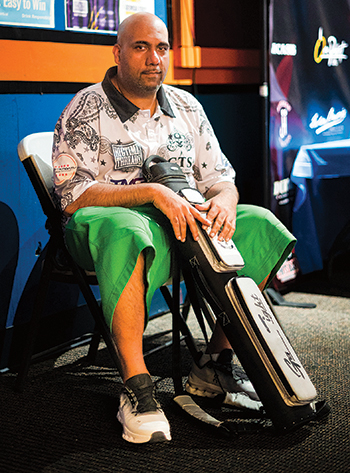 One-pocket legend Chohan, house pro at Buffalos, refers to the iconic room as the “Mecca of pool.” Then Long indicates towards one of the three flatscreens plastered on the wall showing the PoolActionTV live stream match happening just a few steps away from where we are now. The player draw is done on an empty table, with the top players drawing playing cards to determine their places on the flow chart. The unpredictable process produces a star-studded first round clash between Lunda and Gomez, the third and fourth picks in the Calcutta. It's the type of match that's bound to be a gamechanger. “I really had identified this guy because he's underrated a little bit,” Long says. “Some of these guys don't think he's as great of a player as I do.” That guy is Gomez, who he grabbed with the third blind bid in the Calcutta for $26,000. He was down 3-0 in the match but is clawing his way back into the match as Long and I continue talking. Gomez was relatively new to one-pocket five years, Long explains, but Long thinks the Filipino has emerged as one of the top five players in the world. He watches each move with excitement, and incredulity when he disagrees with a strategy. I leave the back office before the match finishes and find my way over to some other tables. Later, I return to see Gomez finish off Lunda just after 3:00 a.m. with a beautiful shot. His first challenge passed on his way to winning the tournament. “This is a tournament,” Long had told me earlier in our conversation, “that can change your life if you win it.” But I won't see Gomez's life change in a few days' time. 3:35 a.m. — Here's something to know about Buffalos as you head out the door: you'll almost always leave knowing you're missing out on more action. I knew that was going to happen whenever I decided my sojourn through the retro club reached its conclusion. My trip was long in many ways. I spent more than 33 straight hours of my life at Buffalos. The few hours I wasn't there I was sleeping in my hotel, driving over from my one-bedroom or grabbing a quick bite on the way. Luckily, I left with my bank account intact. Wednesday night into Thursday morning was slower than most tournament overnights. Long first round games seemed to keep some of the biggest gamblers away from the action. Bolm didn't end up showing up Wednesday. The participants in the never-ending 2 v. 2 game on the main table had returned home to get some rest. That did make it a little bit easier to walk away. But even as I did, here comes a somewhat-rested Tiger back into the arena. Here comes some more non-pros trying to get a game going. Here come a few groups of people forming to witness the action. 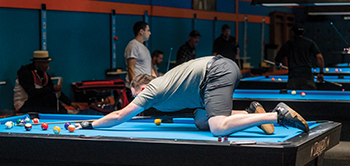 Everything at Buffalos is unencumbered by rules, right down to table etiquette for match play. Like the Masters, Buffalos is defined by its unique characteristics. The Masters has Augusta, Ga., and Green Jackets and yellow flags and perfectly manicured fairways and its pimento cheese sandwiches. Buffalos has Louisiana flair and champions that get their faces painted on the wall and beautiful Diamonds and players unencumbered by rules preventing them from climbing on the tables and flipping quarters for thousands of dollars. They are unicorns in worlds of typical. I walk out the doors a little after 3:30 a.m. tired but luckily not as fried as the various tenders and shrimp that had sustained me. The sky was dark, but the parking lot was still fairly full. A long train lay idle on the tracks up in the night. On the ground, with the light of the Buffalos sign behind me, no train blocked my path. I crossed over the tracks, my pilgrimage complete. Gomez Claims One-Pocket Title Basketball and hockey teams lift banners in their arenas. Some baseball teams raise flags high in the sky. But at Buffalo's Billiards right outside New Orleans, they have a different tradition to honor their champions. The winner of their yearly one-pocket tournament gets their face painted on the poolroom's wall. “It's the biggest event of its kind,” said Joe Long, a lawyer and backer of the tournament. “It's got the toughest field. It's the most prestigious to win it. You don't get a trophy. You get your face painted on the wall.” Only a select few entered this year's Ninth Annual Buffalo's Pro Classic lucky enough to have their likenesses previously painted on the dark blue wall in the back corner of the famous Louisiana venue. But Roberto “Superman” Gomez earned his spot on the Wall of Champions by winning the One-Pocket Championship at the Ninth Annual Buffalo's Pro Classic. Gomez defeated Sky Woodward in the final to win his first title at the iconic Memorial Day Week event. Gomez had been the third pick in the auction with Joe Long paying $26,000 for the eventual tournament winner. The Calcutta finished with a new record of $314,800. It was not an easy road to the championship for the Filipino star. Gomez had no time to work his way into the tournament as he had to face the defending champion Evan Lunda in a first-round match on the main table shortly after the historic Calcutta ended. The tense, thrilling tournament opener saw Gomez emerge victorious with a 5-4 victory. Gomez started making quicker work of his opponents after his battle with Lunda. He beat Alex Calderon in the second round and Scott Frost in the third round by 5-1 score lines. 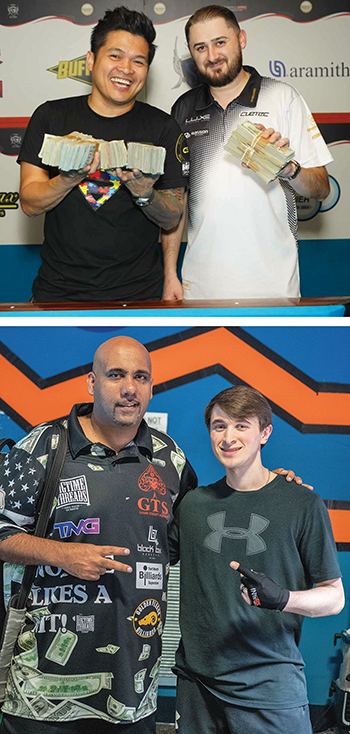 Gomez (top, with runner-up Woodward) cashed in in the main event, while Fracasso-Verner (bottom right) topped Chohan in 9-ball. (Photos by Desi Williams) A 5-0 victory over Roland Garcia pushed Gomez to the hot seat match against Fedor Gorst, the second pick in the Calcutta a few days earlier with a price tag of $43,000. (Tony Chohan had been the first blind bid at $45,000.) But Gomez couldn't be stopped, claiming a 5-2 victory and finding himself just one win away from the title. Woodward — who defeated Gorst for the right to face Gomez — put up a fight in the finals and squeaked out a 5-4 first set win to set up one final winner-take-all match for the title. Gomez recovered to goose egg Woodward and win the final match 5-0 and win the title. While Gomez hadn't previously triumphed in the Pro One-Pocket Championship at Buffalo's Pro Classic, he has won previously at the Louisiana venue. In fact, Gomez had emerged victorious in November at Buffalo's Open One-Pocket Championship. He had bashed his way through that tournament undefeated before completing the perfect run with a win over Sergio Rivas in the finals. Chohan, the multiple time One-Pocket winner, surprised most by instead finding himself in the final of the 9-Ball Championship but fell to Lukas Fracasso-Verner, 9-3. The total winnings handed out at the tournament totaled $530,060. It's just always been a good city for action,” Chohan said. “Money gets thrown around a little bit easier than most places in the country, than any other place in the country for that matter.” —By Peter Warren
|
|
Since 1978, Billiards Digest magazine has been the pool world’s best source for news, tournament coverage, player profiles, bold editorials, and advice on how to play pool. Our instructors include superstars Nick Varner and Jeanette Lee. Every issue features the pool accessories and equipment you love — pool cues, pool tables, instruction aids and more. Columnists Mike Shamos and R.A. Dyer examine legends like Willie Mosconi and Minnesota Fats, and dig deep into the histories of pool games like 8-ball, 9-ball and straight pool.
Copyright © 1997 - 2025 Billiards Digest
All Rights Reserved
Luby Publishing, Inc.
310 Busse Highway PBM #319 | Park Ridge, IL 60068
Phone: 312-341-1110 | Fax: 312-341-1469